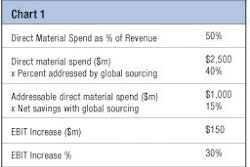Atlanta — December 1, 2006 — Companies can cut finance process costs by more than 40 percent through the use of shared services and also improve customer satisfaction, process quality and productivity, but many companies never see these gains due to common errors in their sourcing decision making or implementation efforts, according to new research findings from The Hackett Group.
Hackett's 2006 Enterprise Book of Numbers analysis found that nearly one in every five companies see process costs drop by more than 40 percent as a result of their shared services implementations. But more than 30 percent of all companies see process costs remain unchanged or actually increase as a result of shared services implementations, and another 12 percent see only small cost reductions.
Similar results were found in analyses of the impact of shared services on customer satisfaction, process quality and productivity.
Hackett's research identified several best practices companies use to generate improved performance in these areas as part of shared services implementations. Hackett also detailed common mistakes companies make that prevent them from seeing improvements.
Slow and Steady in Europe
In a separate study of European companies, Hackett found more balanced results, with most companies showing 10-40 percent cost reduction as a result of finance shared services implementations.
Hackett's analysis found two major factors drove the differing results: U.S. companies are often more aggressive in their shared services implementations, while European companies take a more conservative approach, weighing potential return on investment and possible risk. This leads European companies to generate less dramatic cost savings, but also ensures that there are far fewer cases among European companies where the use of shared services causes costs to increase.
In addition, Hackett believes that European companies are more likely to be taking advantage of wage arbitrage due to the close proximity of Eastern European labor markets.
Getting It Right
"Shared services is clearly a powerful technique for improving efficiency and effectiveness in corporate finance," said Hackett Senior Business Advisor Tom Bangemann. "But it takes commitment, focus and initiative to get it right. Companies that bring these to the table reap significant rewards. But those that don't can feel all the pain and see none of the gain. Worse yet, they can even find that their costs increase."
According to Hackett Senior Business Advisor Penny Weller, companies that get the most out of shared services implementations treat them like an independent business and emphasize elements such as customer satisfaction, performance measurement and accountability.
"Shared services can't be just a corporate mandate that companies try to enforce," Weller said. "The best also focus on change management and understand that eliminating the lion's share of decentralized activity in corporate finance takes time, communication and the backing of senior management.
"You can't expect to reeducate everyone overnight," Weller continued. "If you get this part wrong, people dig their heels in and you end up with 'shadow systems' that undercut centralization efforts. Finally, shared services must be seen as an opportunity for process improvement. Standardization and simplification are where a lot of the savings come from. They need to be an integral part of the change effort."
The value of successful shared services even extends well beyond short-term return on investment, Weller explained. "It's the first step to further reducing cost structures through globalization. Once finance processes have been centralized and standardized, they become portable, and it becomes much easier to take advantage of labor arbitrage opportunities available offshore, either through captive operations in low-cost labor markets or by outsourcing."
Hackett's 2006 Enterprise Book of Numbers analysis found that nearly one in every five companies see process costs drop by more than 40 percent as a result of their shared services implementations. But more than 30 percent of all companies see process costs remain unchanged or actually increase as a result of shared services implementations, and another 12 percent see only small cost reductions.
Similar results were found in analyses of the impact of shared services on customer satisfaction, process quality and productivity.
Hackett's research identified several best practices companies use to generate improved performance in these areas as part of shared services implementations. Hackett also detailed common mistakes companies make that prevent them from seeing improvements.
Slow and Steady in Europe
In a separate study of European companies, Hackett found more balanced results, with most companies showing 10-40 percent cost reduction as a result of finance shared services implementations.
Hackett's analysis found two major factors drove the differing results: U.S. companies are often more aggressive in their shared services implementations, while European companies take a more conservative approach, weighing potential return on investment and possible risk. This leads European companies to generate less dramatic cost savings, but also ensures that there are far fewer cases among European companies where the use of shared services causes costs to increase.
In addition, Hackett believes that European companies are more likely to be taking advantage of wage arbitrage due to the close proximity of Eastern European labor markets.
Getting It Right
"Shared services is clearly a powerful technique for improving efficiency and effectiveness in corporate finance," said Hackett Senior Business Advisor Tom Bangemann. "But it takes commitment, focus and initiative to get it right. Companies that bring these to the table reap significant rewards. But those that don't can feel all the pain and see none of the gain. Worse yet, they can even find that their costs increase."
According to Hackett Senior Business Advisor Penny Weller, companies that get the most out of shared services implementations treat them like an independent business and emphasize elements such as customer satisfaction, performance measurement and accountability.
"Shared services can't be just a corporate mandate that companies try to enforce," Weller said. "The best also focus on change management and understand that eliminating the lion's share of decentralized activity in corporate finance takes time, communication and the backing of senior management.
"You can't expect to reeducate everyone overnight," Weller continued. "If you get this part wrong, people dig their heels in and you end up with 'shadow systems' that undercut centralization efforts. Finally, shared services must be seen as an opportunity for process improvement. Standardization and simplification are where a lot of the savings come from. They need to be an integral part of the change effort."
The value of successful shared services even extends well beyond short-term return on investment, Weller explained. "It's the first step to further reducing cost structures through globalization. Once finance processes have been centralized and standardized, they become portable, and it becomes much easier to take advantage of labor arbitrage opportunities available offshore, either through captive operations in low-cost labor markets or by outsourcing."












